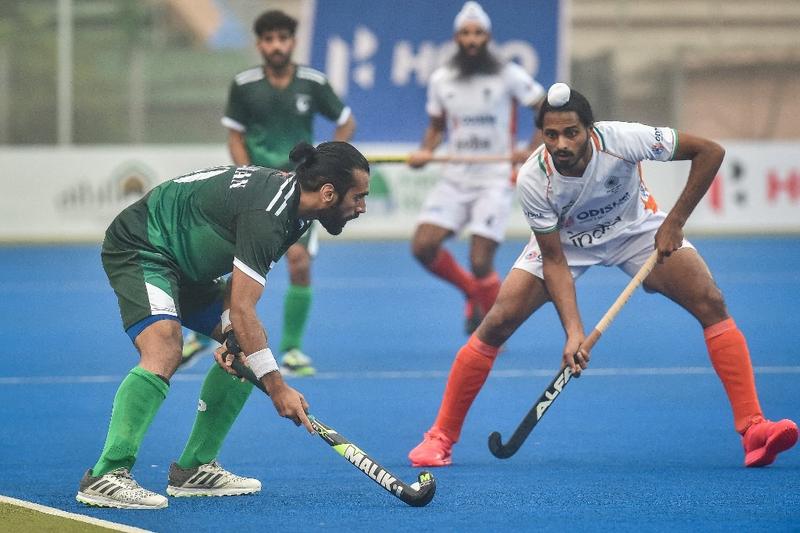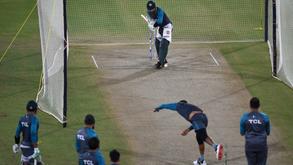 Pakistan's Ali Shan (left) and India's Gursahibjit Singh (right) fight for the ball during the men's field hockey third place match between India and Pakistan at the Asian Championship Trophy tournament in Dhaka on Dec 22, 2021. (PHOTO / AFP)
Pakistan's Ali Shan (left) and India's Gursahibjit Singh (right) fight for the ball during the men's field hockey third place match between India and Pakistan at the Asian Championship Trophy tournament in Dhaka on Dec 22, 2021. (PHOTO / AFP)
On the outskirts of Islamabad, burly men bind together in a scrum on a rugby pitch that has seen better days. The sign bearing the club's name is worn. The floodlights are too costly to use, given high electricity prices and the paltry $135 that the club earns in total through membership fees every month.
Watching the players, coach Mohammed Zahir Uddin said ruefully: "There's only one game in Pakistan."
That would be cricket, the country's most popular sport, a juggernaut when it comes to sponsorship, broadcasting rights and capturing the public's imagination.
Cricket has totally eclipsed other sports, even ones Pakistan once excelled at. Field hockey, Pakistan's national sport, once propelled the country to Olympic gold and global glory, but it has waned in popularity and participation. Pakistan dominated the world of squash for decades, only to become an also-ran.
Prospects are even bleaker for a sport like rugby, which has no heyday or heroes in Pakistan.
Pakistan, with a population of 220 million, has a national government sports budget of around $15.3 million, far smaller than others in the region. The Pakistan Sports Board, which oversees all sports in the country and their federations, did not respond to interview requests
"There's no support from the bodies that there ought to be in terms of funding or spreading the word," said Hammad Safdar, who captains Pakistan's national rugby team. "The majority of sports have the same issue. That's why, in terms of performance, in the later stages of a test match, we are often found wanting, because there's no foundation."
Pakistan hosts the South Asian Games next year, the biggest sporting tournament to be held in the country for 20 years. It won 143 medals the last time it hosted, including 38 golds. But years of sporting neglect could affect its medal tally this time.
Advocates of sports toiling in cricket's shadow say they don't have the environment to thrive or compete for top prizes, with a lack of investment and interest. Even the universally loved game of soccer struggles in Pakistan. The country has been suspended from FIFA, the sport's global governing body, stunting its growth at home and chances overseas.
Pakistan, with a population of 220 million, has a national government sports budget of around $15.3 million, far smaller than others in the region. The Pakistan Sports Board, which oversees all sports in the country and their federations, did not respond to interview requests.
Rugby gets no government money, but operates with a grant from World Rugby. If it needs more, it asks the chairman or president of the Pakistan Rugby Union to dip into their own pockets.
The national rugby pitch in the eastern city of Lahore is on army land. It lacks changing rooms. It has no seating, so organizers rent chairs for tournaments. Rugby development coach Shakeel Malik concedes it's hard to attract funding without results, but that it's hard to get results without funding.
ALSO READ: New superpower awaited as India women's cricket set to take off
Cricket, which also gets no government funding, has a budget of around $66 million. It's popularity shot into the stratosphere following the nation's World Cup win in 1992, with a team captained by Imran Khan, who later entered politics and served as prime minister from 2018-2022.
Pakistan has never dominated cricket the way it once did in squash and hockey; it has only two world championships to its name (winning its second in 2009 in the sport's shortened T20 format). But, it's a big business with the infrastructure to nurture talent, a thirst for empire building, rampant commercialism, and a steady supply of domestic and international matches for TV.
 Pakistan's players attend a practice session at the National Cricket Stadium in Karachi on Sept 18, 2022, ahead of their first Twenty20 cricket match against England. (PHOTO / AFP)
Pakistan's players attend a practice session at the National Cricket Stadium in Karachi on Sept 18, 2022, ahead of their first Twenty20 cricket match against England. (PHOTO / AFP)
In the heyday of field hockey, people turned out in the tens of thousands to watch matches, said Samiullah Khan, a player who, until retirement in the 1990s, helped win Pakistan a sackful of medals in the sport at the Olympics, World Cup and Asian Games
Its rise in the 1990s coincided with the beginning of the end for hockey and squash.
Pakistan was the superpower of squash for decades, winning the British Open 17 years in a row by 1963.
Specifically, one family, the Khans, ruled the sport. The last of the dynasty — Jahangir Khan, a former World No 1 racket-wielding machine — was unbeaten for hundreds of matches. He won the British Open 10 years in a row until his final victory in 1991.
Khan told The Associated Press that even he doesn't understand how the family amassed as many trophies as they did, without facilities and investment. "Even today, Pakistan's name comes first in squash, and so does this family's name," he said, speaking at the squash complex named after him in Karachi.
He's pained by its decline. Pakistan is now 65th in the world men's squash rankings. Khan said the sport failed to build on his family's legacy.
He argues that mismanagement had undermined the sport and that players need to achieve more to attract sponsorship. "Funding is not a solution. The nation produced a world champion when it had nothing," he says.
And there is also cricket's stranglehold. "It's not necessary to have all the talent playing one thing," he said.
In the heyday of field hockey, people turned out in the tens of thousands to watch matches, said Samiullah Khan, a player who, until retirement in the 1990s, helped win Pakistan a sackful of medals in the sport at the Olympics, World Cup and Asian Games.
But there is hope, and a love that lingers for hockey. In a Karachi suburb, about a dozen young women pad up for practice on a team on the books of the Karachi Hockey Association
"It hurts my heart" to see the current state of hockey, he lamented. In his view, Pakistan's teams didn't adjust to changes like synthetic turf and rule-changes in Europe that, in his view, turned the sport into "a free-for-all."
READ MORE: Australia unveils partnership to boost cricket in Pacific islands
"Hockey became like any other sport, like rugby. The power left, the skill left," he said.
But there is hope, and a love that lingers for hockey. In a Karachi suburb, about a dozen young women pad up for practice on a team on the books of the Karachi Hockey Association.
Kashmala Batool, 30, has been playing hockey for almost half her life. "It's our national game," she said. "Despite it not getting support or government funding, the enjoyment we get playing our national game can't be found in any other."
Shazma Naseem, the goalkeeper, started out in college and has been playing at the national level for five years. She sees the enthusiasm her parents still have for the sport and feels a duty to keep it going.
"It's absolutely our job to play hockey well, to make our name in the sport, so that future generations know about hockey and that this is also our national game."
Agencies via Xinhua


